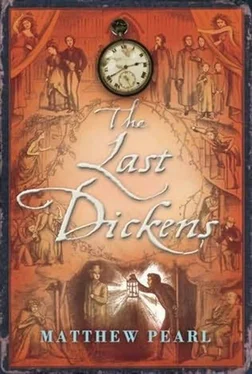“Our united thanks,” she said tentatively, as the interview seemed to be at its end.
Wakefield took Rebecca's hand and slowly pressed his lips against it. “I hope that is not too bold, my dear,” he said. “You are truly the pink of perfection, a rare type of woman not found enough among the conceited peacocks of London. Mr. Osgood is fortunate for your loyalty.”
Taken by a peculiar sensation of vulnerability and freedom, she found herself at a loss for words.
“Mr. Osgood told me about your having been married before,” Wakefield went on in a gentle tone. “But the laws are different in England. You need not give a thought to that ever again, if you wished.”
“Mr. Osgood told you of my being divorced?” Rebecca asked in surprise.
“Yes, when we were on board the Samaria ,” he said. Sensing her confusion, he added, “He wished merely to protect you, Miss Sand. I believe he could see my instant and sincere affection for you and wanted to prevent any impropriety. Is my interest in your life so surprising, my dear, as the expression on your face makes it appear?”
The bells of the carriage readying to drive the patient to the Falstaff Inn jingled.
“I must go help him, Mr. Wakefield,” Rebecca said.
EACH DAY THE publisher awoke from his sleep with a little more physical stamina and more pronounced mental restlessness. The fractures in his ribs, though still painful, were healing at pace. Dr. Steele had given urgent orders to Osgood to keep his torso in bandages and restrict heavy breathing or exertion at risk to causing grave permanent injury to his lungs. One morning, as he cleared Osgood's breakfast, the landlord of the inn placed a fresh vase of flowers on the washstand.
“That is kind of you, Sir Falstaff,” said Rebecca, who sat by Osgood's side and bathed his forehead.
“Many apologies if I interject trivial business upon the patient's health,” the landlord said with a tentative air. “I am afraid I require your signature on some papers, Mr. Osgood, to extend your stay beyond our original arrangement, owing to the circumstances.”
“Of course,” Osgood said.
As Osgood was examining the bill of charges, which he rested on top of a pillow, he paused. Above the landlord's stationery was Sir John Falstaff's given name, William Stocker Trood. Trood: Osgood mouthed the word to himself.
“Anything wrong, my dear Mr. Osgood?” asked the landlord.
“I was only noting your surname's resemblance to the title of Mr. Dickens's last book.”
“Ah! Poor Mr. Dickens, how he is missed around here, I cannot say! I have to confess, Mr. Osgood, that this ”-here the landlord stopped and pulled at his old-fashioned baggy coat and neck cloth- “I mean these costumes and my trying to be like the fat knight, Falstaff. This is because of him.”
“Because of Dickens?”
He nodded. “For many years people have come to Rochester from all over the world in order to get a glimpse of Mr. Dickens's home and perhaps even of the man himself! Americans would come round and leave their card hoping to be invited into Gadshill, in the meantime coming for bread and wine at our fireside. At other times, the Dickens family would have too many guests and they would use us for additional lodging. The location of our little place has meant that we could always command decent fees for our beds and meals. Now that he is gone and the family leaving, well, I have had to think of other ways to attract sightseers. As my sister says, God protect us if we must rest our small claims on my Falstaff impersonation! ‘The better part of valor is discretion, in the which better part I have saved my life.’ I tried to memorize some lines, but you will notice I have nothing of the theater about me.”
After finishing with their business, the Falstaff landlord bowed and began to exit.
“Mr. Osgood? What is it? What's the matter?” Rebecca asked when she saw the color drain from his face all at once.
“His son, his son died…” Osgood murmured before trailing off.
“What?” Rebecca asked, confused and worried about his state of mind. “Whose son?”
Flashes of all the connections between the small town of Rochester and Dickens's books raced through Osgood's mind. Dickens had taken names, characters, and stories from the country life outside his study window. The novels of Rudge and Dorrit had intimations of their stories in the byways of Rochester, what about the story of poor Drood? Osgood spoke more to himself than Rebecca. “He became sad at seeing the opium poppy on the table downstairs and said opium had to do with his son's death… but I never thought of…”
Suddenly, the publisher jumped down from the bed, knees wobbling as his legs strove for balance. With one arm wrapped around himself, he struggled to drag his beaten body into the hallway.
“Mr. Trood! Your son!”
The landlord's face went snowy white, his self-appointed role of the jolly host vanishing again. “Perhaps we have had enough conversation today,” he said sharply. He saw Osgood was waiting for more. He looked up and down the stairs. “I cannot talk of it here. Are you well enough to come into town, Mr. Osgood? If you walk with me, I'll promise you a story.”
Osgood insisted. “Your son, sir, what was your son's name?”
The landlord took in a gulp of air to regain his voice. “It was Edward. Edward Trood,” he said. “He would have been around your age, had he never disappeared.”

EDWARD TROOD'S FINAL DISAPPEARANCE BEFORE HIS MURDER did not arouse much concern because it was not the first time.
Edward had had a difficult early life. He was always small for his age and was born with a clubbed right foot. The other boys of the village showed no mercy in their torments. Then the stealing began. Small amounts of change at first, extra food from the cupboards, articles of clothing. Some of it, as far as his parents could determine, were offerings by the boy to his peers on threat of violent retribution. But sometimes they would find a missing object-a family candlestick, for instance-buried in the garden, as though in the crippled boy's gnawing imagination it would sprout and grow.
It was worse than all of this. Worse because the boy was by all outward appearances quite good. In the presence of strangers, even most times in the presence of his family, Eddie was polite, keen to keep his manners and his dress orderly. He was genuinely kind and amiable when in good spirits.
When William and his wife asked for counsel about their son from the town minister, they would be greeted by benevolent laughter. Edward? What trouble could be fancied in little, complying, polite, well-mannered Eddie Trood? The parents tried to force themselves into the same attitude. Our Eddie? Boyish mischief, that's all that plagued him. There would be long periods of quiet when Edward, a good scholar according to his teachers (some said exceptional), behaved at home and in his school and managed to avoid trouble from his tormentors.
Then he'd steal again-this time from the small hotel where William and his wife both worked doing cooking and housekeeping. Edward forced open the ancient landlord's locked drawer and removed a purse containing several pounds. And-the true horror-Edward had committed the theft in plain sight of his mother! He brushed right by her as though he didn't know her from a housemaid.
That evening, Eddie had appeared back at home with a sullen but guiltless demeanor.
“My poor wife could hardly utter a word,” William Trood said, taking in a very deep breath like a dying man as he retold the story. Os-good and Rebecca sat next to him on the pew of the empty but sublime Rochester Cathedral, which was filled with ancient light and atmosphere, where the landlord had insisted they go to speak. He had refused to say another word at the Falstaff, as though there were too many ghosts there eavesdropping. Here, the story could be told under God's protection.
Читать дальше













